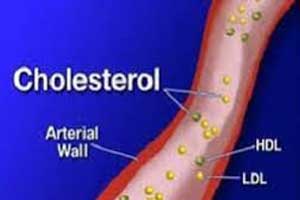- Home
- Editorial
- News
- Practice Guidelines
- Anesthesiology Guidelines
- Cancer Guidelines
- Cardiac Sciences Guidelines
- Critical Care Guidelines
- Dentistry Guidelines
- Dermatology Guidelines
- Diabetes and Endo Guidelines
- Diagnostics Guidelines
- ENT Guidelines
- Featured Practice Guidelines
- Gastroenterology Guidelines
- Geriatrics Guidelines
- Medicine Guidelines
- Nephrology Guidelines
- Neurosciences Guidelines
- Obs and Gynae Guidelines
- Ophthalmology Guidelines
- Orthopaedics Guidelines
- Paediatrics Guidelines
- Psychiatry Guidelines
- Pulmonology Guidelines
- Radiology Guidelines
- Surgery Guidelines
- Urology Guidelines
PCSK9 inhibitors beneficial for patients with high lipoprotein(a) levels

PCSK9 inhibitors reduced lipoprotein(a) levels and that patients starting with higher Lp(a) levels appeared to derive greater absolute benefit from taking PSCK9 inhibitors (including Evolocumab), according to the latest analysis from FOURIER (Further Cardiovascular Outcomes Research With PCSK9 Inhibition in Subjects With Elevated Risk) trial. The results were presented at the 86th Annual Congress of the European Atherosclerosis Society.
The study was conducted by Michelle L. O'Donoghue, from Department of Cardiovascular Medicine at Brigham and Women's Hospital, and colleagues to evaluate the role of PCSK9 inhibition on lipoprotein(a) concentration.
Lipoprotein(a) is a type of LDL (low-density lipoprotein) cholesterol, and large amounts of data support the link between higher levels of lipoprotein(a) and an increased risk of cardiovascular events. Atherosclerosis patients with higher baseline lipoprotein(a) levels have a 26 percent greater risk of coronary death from heart attack than patients with the lowest lipoprotein(a) levels. To date, there have been limited therapies available that can effectively reduce lipoprotein(a) levels and reduce the risk of cardiovascular events.
"In addition to its effects for reducing LDL cholesterol, PCSK9 inhibition may emerge as an important option for patients with elevated lipoprotein(a) concentration," said first author O'Donoghue. "We have identified a therapy, evolocumab treatment, that effectively reduces lipoprotein(a) concentration."
The FOURIER trial was a randomized, double-blind, placebo-controlled trial, which evaluated adding evolocumab to the treatment regimen in over 27,000 patients with high LDL cholesterol levels.
Key Findings of FOURIER trial:
- Evolocumab was found to significantly reduce Lp(a) levels and reduce risk of cardiovascular events.
- Patients with the higher baseline lipoprotein(a) levels benefited the most from evolocumab treatment, with a 24 percent decrease in the risk of heart attack, stroke or cardiovascular death.
- Patients with lower baseline lipoprotein(a) levels had a 15 percent reduction in risk with evolocumab treatment.
The study (FOURIER trial) was published in The New England Journal of Medicine.
"PSCK9 inhibitors may help us achieve a dual goal in treating cardiovascular patients: We might be able to reduce both LDL cholesterol levels and lipoprotein(a) levels with this treatment," said O'Donoghue. "This treatment was particularly effective for patients with higher Lp(a) levels, as these patients derived a greater absolute reduction in risk after evolocumab treatment."
For related information click on the link: 10.1056/NEJMoa1615664
cardiovascular deathcardiovascular diseaseEuropean Atherosclerosis Societyevolocumabheart-attackLDL cholesterollipoprotein reductionLipoprotein(a)low-density lipoproteinMichelle L. O'DonoghuePCSK9 inhibitionPCSK9 inhibitiorsPSCK9
Source : With inputs from NEJMNext Story
NO DATA FOUND

Disclaimer: This site is primarily intended for healthcare professionals. Any content/information on this website does not replace the advice of medical and/or health professionals and should not be construed as medical/diagnostic advice/endorsement or prescription. Use of this site is subject to our terms of use, privacy policy, advertisement policy. © 2020 Minerva Medical Treatment Pvt Ltd